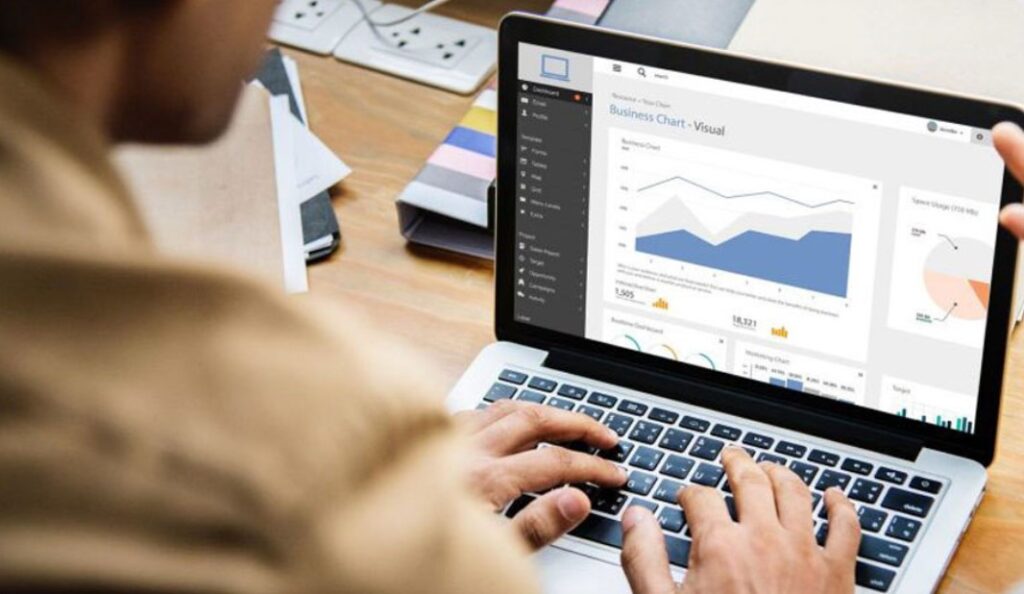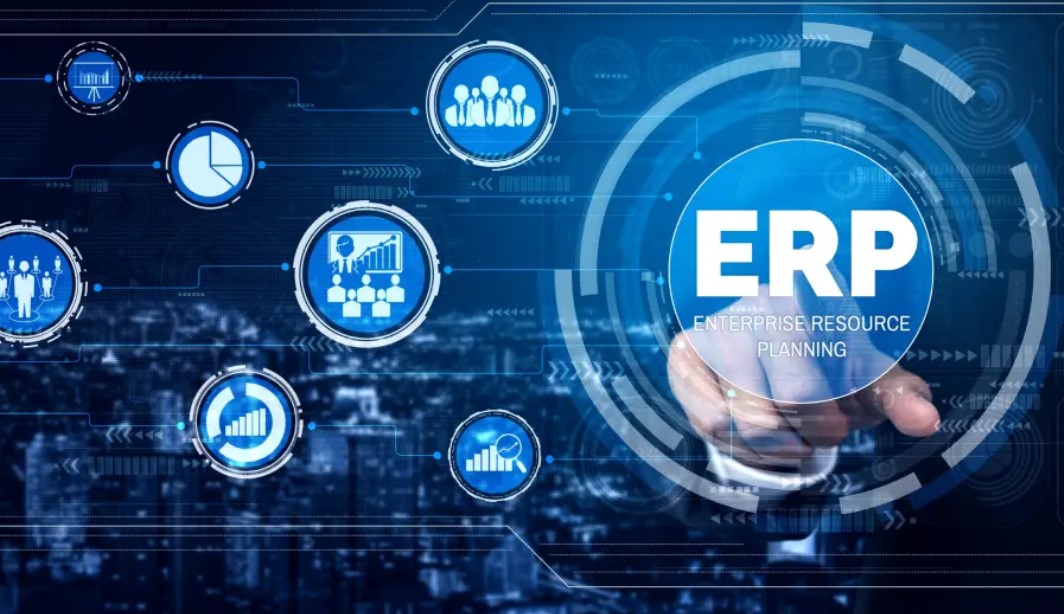For small businesses looking to streamline operations, improve efficiency, and gain better control over their resources, ERP software is a game-changer. In this guide, we’ll explore the top ERP solutions tailored for small businesses, how they benefit companies, and provide detailed comparisons to help you make the best choice. Let’s dive into the best ERP software solutions available today!
What is ERP Software for Small Businesses?

Enterprise Resource Planning (ERP) software is a comprehensive system designed to integrate and automate various core business processes, such as finance, inventory, human resources, sales, and customer relationship management (CRM). For small businesses, ERP software is particularly valuable because it consolidates all these critical functions into one unified platform, streamlining operations and providing greater efficiency.
How Does ERP Software Work?
In a small business setting, multiple departments—like accounting, sales, inventory, and customer support—often use separate systems or even manual processes to manage their tasks. This separation leads to data silos, inefficiencies, and a lack of visibility across the organization. An ERP system connects these departments, providing a centralized source of data that is accessible to all relevant stakeholders.
For instance, when a sales order is placed, the ERP system automatically updates inventory, generates an invoice, adjusts financial data, and schedules production (if applicable) without needing any manual input. The entire flow from order placement to fulfillment is automated and visible in real-time. This makes ERP software a powerful tool for optimizing day-to-day operations in small businesses.
Key Components of ERP Software for Small Businesses
- Financial Management
ERP software offers robust financial management tools, helping small businesses manage accounting, invoicing, payroll, and financial reporting. Real-time access to financial data helps owners make informed decisions and stay on top of cash flow, taxes, and budgeting.- Example: A small retail business can automatically track all sales and expenses in one system, simplifying end-of-month reconciliations and ensuring accurate financial statements.
- Inventory and Supply Chain Management
Managing inventory can be a challenge for small businesses, especially those dealing with physical goods. ERP software integrates inventory management into one system, allowing businesses to track stock levels, manage reordering, and forecast inventory needs based on historical data.- Example: A small manufacturing company can monitor raw materials and finished goods in real-time, ensuring they never run out of stock while minimizing excess inventory.
- Sales and Customer Relationship Management (CRM)
ERP systems also include CRM features, helping small businesses manage customer interactions, track sales, and ensure that customer needs are met. This functionality helps companies improve customer satisfaction and retention by providing a 360-degree view of all customer touchpoints.- Example: A small service-based company can track client communications, manage appointments, and keep a record of service history, all from the same platform.
- Human Resources (HR) Management
For small businesses, managing employee data, payroll, and compliance can be time-consuming. ERP software automates many HR processes, such as payroll, benefits administration, and employee performance tracking, ensuring compliance with labor laws and reducing administrative overhead.- Example: A small business can easily track employee hours, automate payroll calculations, and stay compliant with employment regulations.
Why Do Small Businesses Need ERP Software?
Small businesses face unique challenges as they grow, such as limited resources, manual processes, and disconnected systems. Implementing ERP software helps overcome these hurdles by:
- Centralizing Business Processes: Instead of juggling multiple software tools or manual methods, small businesses can manage all core operations from a single platform.
- Enhancing Efficiency: Automation of routine tasks reduces the chance for human error, speeds up workflows, and allows teams to focus on strategic activities rather than administrative tasks.
- Real-Time Decision-Making: With real-time data visibility, small business owners and managers can make informed decisions quickly, whether it’s about finances, production, or customer service.
- Scalability: As a small business grows, so does its complexity. ERP software is scalable, allowing small businesses to easily expand their operations, add more users, and incorporate additional functionalities without disrupting the system.
Benefits of ERP Software for Small Businesses

- Improved Efficiency and Productivity
ERP software automates repetitive tasks, such as inventory management, order tracking, and financial reporting. This not only saves time but also reduces errors, enabling small businesses to focus on growth. - Better Data Visibility
ERP solutions centralize all business data in one place, providing real-time insights into key business metrics. With improved data visibility, small business owners can make informed decisions quickly. - Cost Savings
By optimizing processes and eliminating inefficiencies, ERP software can help small businesses save on operational costs. Automation of tasks like invoicing, payroll, and inventory tracking reduces the need for manual labor. - Scalability
As your business grows, your ERP system can grow with you. ERP solutions are flexible and scalable, meaning they can handle increased complexity, additional users, and new product lines without needing a complete system overhaul. - Improved Customer Satisfaction
ERP systems allow businesses to track customer interactions, manage orders efficiently, and provide better after-sales support, leading to improved customer satisfaction and loyalty.
Top 5 ERP Software for Small Businesses in 2024

Here’s a breakdown of the top ERP solutions for small businesses. These software solutions are tailored to fit the needs of small to medium-sized companies, offering robust features, affordability, and scalability.
1. Zoho ERP
Zoho ERP is a highly affordable and flexible solution for small businesses, offering comprehensive tools to manage finance, sales, and inventory. It’s known for its easy-to-use interface and wide range of customization options.
- Pros:
Affordable pricing for small businesses
Easy integration with other Zoho products
Customizable workflows - Cons:
Limited advanced features for larger enterprises
Customer support can be slow - Price: Starting at $30 per user/month
- Key Features:
- Financial management
- Sales and inventory tracking
- Custom reporting
- Use Case: Best for small businesses looking for affordable, all-in-one ERP software.
- Visit Zoho ERP
2. Odoo ERP
Odoo ERP is an open-source platform that offers a wide range of modules for small businesses, including sales, finance, CRM, and HR management. Its modular nature allows businesses to start small and add more functionalities as they grow.
- Pros:
Modular system for flexibility
Open-source, making it highly customizable
Affordable pricing - Cons:
Requires technical expertise for customization
Limited out-of-the-box features - Price: Free for one app, paid plans start at $24 per user/month
- Key Features:
- CRM and sales management
- Project management
- Accounting and invoicing
- Use Case: Perfect for small businesses looking for a customizable, open-source ERP solution.
- Visit Odoo ERP
3. QuickBooks Commerce
QuickBooks Commerce is designed specifically for small to mid-sized businesses, focusing on inventory and order management. It integrates seamlessly with QuickBooks Online, making it a great option for businesses already using QuickBooks for accounting.
- Pros:
Seamless integration with QuickBooks
Excellent for inventory and order management
User-friendly interface - Cons:
Limited to businesses focused on inventory management
Higher cost for advanced features - Price: Starts at $39 per month
- Key Features:
- Inventory management
- Order fulfillment tracking
- Financial management integration
- Use Case: Ideal for small businesses focused on inventory and order management, particularly those already using QuickBooks.
- Visit QuickBooks Commerce
4. Xero ER
Xero ERP is a cloud-based accounting and ERP solution perfect for small businesses. It offers powerful financial management tools with additional modules for payroll, inventory, and project management.
- Pros:
Easy-to-use interface
Strong financial management tools
Great integration with third-party apps - Cons:
Limited features beyond accounting
No phone support - Price: Starts at $12 per month
- Key Features:
- Payroll and accounting management
- Invoicing and billing
- Inventory tracking
- Use Case: Ideal for small businesses seeking robust accounting and financial management capabilities.
- Visit Xero ERP
5. SAP Business One
SAP Business One is a full-featured ERP solution designed for small to mid-sized businesses. While it’s more expensive than some other options, it offers advanced functionalities typically found in ERP systems for larger companies, making it ideal for small businesses with more complex needs.
- Pros:
Comprehensive set of features
Scalable and flexible
Strong support for manufacturing and distribution businesses - Cons:
Higher cost for implementation
Steeper learning curve - Price: Custom pricing starting around $3,000 per user
- Key Features:
- Manufacturing and supply chain management
- Advanced financials and reporting
- Customer relationship management
- Use Case: Best for small businesses with more complex needs, especially in manufacturing and distribution.
- Visit SAP Business One
Comparison Table of ERP Solutions for Small Businesses

| ERP Software | Use Case | Pros | Cons | Price | Key Features |
|---|---|---|---|---|---|
| Zoho ERP | Small businesses needing affordable ERP | Affordable, easy integration | Limited advanced features | $30 per user/month | Finance, sales, inventory management |
| Odoo ERP | Customizable open-source ERP | Modular, open-source | Requires technical expertise | Free (one app), $24/user | CRM, sales, project management |
| QuickBooks Commerce | Businesses focused on inventory | Great for inventory, order management | Higher cost for advanced features | $39 per month | Inventory and order management |
| Xero ERP | Small businesses needing strong financial tools | Easy to use, integrates well | Limited non-accounting features | $12 per month | Payroll, accounting, invoicing |
| SAP Business One | Small businesses with complex needs | Comprehensive features, scalable | Higher cost, steep learning curve | Custom pricing ($3,000/user) | Manufacturing, supply chain, CRM |
How to Buy ERP Software for Small Businesses

Selecting the right ERP software for your small business can be a game-changer, helping you streamline operations, improve efficiency, and support long-term growth. However, purchasing ERP software can be a complex decision with numerous options to consider. This guide will walk you through the process of how to buy ERP software for small businesses and make an informed decision.
1. Identify Your Business Needs and Goals
Before you start evaluating different ERP systems, it’s crucial to have a clear understanding of your business needs and objectives. ERP software can handle a wide range of functions, such as financial management, inventory tracking, CRM, and human resources, so defining your priorities is the first step.
- Ask yourself the following questions:
- What specific business challenges are you trying to solve with ERP software?
- Which departments or processes will benefit the most from ERP integration?
- Are you looking for specific features like real-time data analytics, inventory automation, or financial reporting?
- How many users will need access to the system, and do they require different permission levels?
For example, if you are a small retail business struggling with inventory control and order fulfillment, your priority may be ERP systems with strong supply chain and inventory management modules.
2. Create a Budget and Set Financial Expectations
ERP software can range in price from a few hundred dollars per month for basic systems to several thousand dollars per user for more advanced solutions. Establishing a realistic budget is essential to narrow down your options and avoid overspending.
- Consider both upfront and ongoing costs, including:
- Licensing fees (per user, monthly, or annually)
- Customization costs (if you need to tailor the ERP to your business)
- Implementation and setup fees
- Training costs for employees to learn the new system
- Ongoing maintenance and support fees
For example, a cloud-based ERP system like Zoho ERP or Odoo ERP can be more affordable for small businesses, with monthly subscription pricing and low upfront costs. On the other hand, larger systems like SAP Business One may involve higher initial investments, but offer more advanced functionalities.
3. Research ERP Software Options
Once you have a clear understanding of your business needs and budget, start researching ERP software options. There are numerous ERP systems available, each with its strengths and weaknesses. Make a list of ERP solutions that align with your business requirements and budget.
- Where to start your research:
- Visit ERP vendor websites to review product features and pricing.
- Read customer reviews and testimonials to understand real-world experiences with the software.
- Ask for recommendations from other small business owners in your industry.
- Consider software comparison websites and ERP software rankings.
At this stage, narrow your list down to 3-5 ERP systems that seem like the best fit for your business.
4. Request Demos and Free Trials
Most ERP vendors offer free demos or trial periods, allowing you to test the software before making a purchase. This is a critical step in the buying process, as it allows you to see firsthand how the ERP system works and whether it fits with your business operations.
- Key things to evaluate during a demo:
- Ease of use: Is the interface user-friendly and intuitive?
- Customizability: Can you tailor the system to meet your specific business needs?
- Integration: Does it integrate with your existing software tools, such as accounting systems or CRM platforms?
- Scalability: Can the ERP system grow with your business?
- Support: What type of customer support does the vendor offer, and is it included in the pricing?
5. Evaluate Implementation and Training Requirements
Once you’ve tested the software, consider the implementation process. Some ERP systems, particularly cloud-based solutions, can be deployed quickly and with minimal effort. Others, especially more complex on-premise solutions, may require a lengthy setup period.
- Questions to ask vendors about implementation:
- How long does the implementation process typically take?
- Do you offer support during the implementation process?
- Will my team need to undergo extensive training to use the software effectively?
- Can the system be customized during implementation to match my business processes?
ERP software that is easy to implement and doesn’t require extensive customization, like QuickBooks Commerce or Xero ERP, can be ideal for small businesses with limited IT resources.
6. Review Long-Term Costs and Maintenance
It’s important to consider the long-term costs associated with ERP software. In addition to the upfront expenses, you’ll need to budget for maintenance, updates, and potential future customizations as your business grows.
- Things to consider:
- Does the vendor provide regular software updates, and are these included in the pricing?
- What are the costs for ongoing customer support or additional training?
- Can you scale the system as your business expands without incurring significant additional costs?
For cloud-based ERP systems like Odoo and Zoho ERP, long-term costs tend to be more predictable because updates and support are typically included in the subscription fee. On-premise systems may require additional IT resources for ongoing maintenance and updates.
7. Make the Purchase and Plan for Implementation
After evaluating your options, it’s time to make a decision. Ensure that the ERP system you choose aligns with your business needs, budget, and long-term growth plans.
- Steps to finalize the purchase:
- Confirm pricing and contract details with the vendor.
- Schedule a full implementation plan, including training for your employees.
- Work closely with the vendor during the initial setup to ensure the software is customized to your needs.
Finally, consider setting measurable goals for the ERP implementation, such as improving inventory accuracy or reducing order processing times, to ensure you are getting the most out of your new system.
FAQs
1. What is the best ERP software for small businesses?
For small businesses, Zoho ERP and Odoo ERP offer affordable, customizable solutions with a wide range of features tailored to small business needs.
2. How much does ERP software cost for small businesses?
ERP pricing varies depending on the provider and features. Costs typically range from $12 per month for basic solutions like Xero to custom pricing for advanced solutions like SAP Business One.
3. Can ERP systems grow with my business?
Yes, ERP systems like Zoho and SAP Business One are highly scalable and can grow as your business expands, adding new users and functionalities.
4. What ERP software is best for inventory management?
For businesses focused on inventory and order management, QuickBooks Commerce is an excellent choice, especially for those already using QuickBooks for accounting.
5. How long does it take to implement ERP software?
Implementation times can vary, but for small businesses, basic ERP solutions can typically be up and running within a few weeks. More complex systems like SAP Business One may take several months to fully implement.
By choosing the right ERP software, small businesses can streamline operations, reduce costs, and position themselves for growth. Whether you need robust financial tools or advanced inventory management, there’s an ERP solution out there to help your business thrive!
